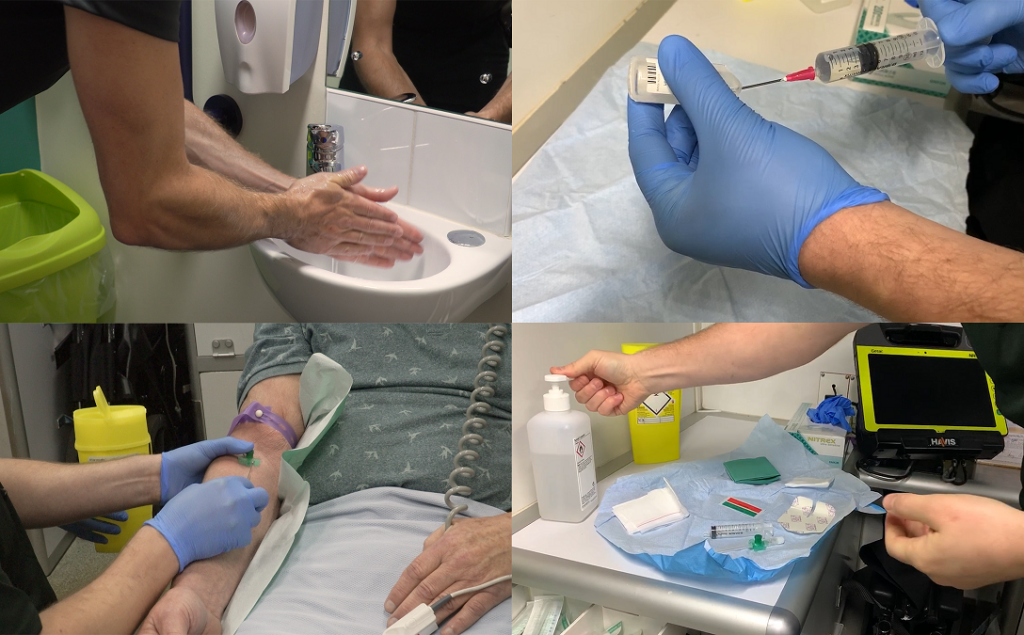What is Infection Prevention & Control?
Infection Prevention & Control (IPC) aims to minimise the spread of infection in healthcare settings using IPC measures such as good hand hygiene, respiratory hygiene, Personal Protective Equipment (PPE), waste management, management of blood / bodily fluid spills and sharps injuries. Other measures include equipment care, laundry management and management of exposures.
Why is Infection Prevention & Control important?
The IPC team work with North West Ambulance Service (NWAS) colleagues and external parties to help ensure the risk of acquiring an infection for patients and staff is minimised.
The risk of catching an infection whilst being treated by one of our clinicians or when being transported to the receiving location is minimal as we ensure that we are following national guidance in relation to Infection Prevention and Control. The IPC team play a crucial part within the organisation in keeping patients and staff free from infections by conducting regular audits.
IPC is important to reduce the number of healthcare associated infections (HCAI) including Clostridium difficile (C-Diff) and Methicillin-resistant staphylococcus aureus (MRSA) and other infections which can cause serious complications for vulnerable individuals. The risk of acquiring these infections can be minimised by using good standard IPC practice and procedures which will protect yourself, family and others. It is important to note that national guidance can change as new infections occur or if prevalence of an infection increases.

The IPC Team
- Director of Infection Prevention and Control – overall responsibility for IPC within NWAS.
- IPC Specialist Lead – specialist knowledge of IPC and responsible for the IPC team .
- IPC Manager – line manager for IPC team.
- 3 x IPC Practitioners – Registered clinicians that provide specialist IPC advice to all staff working within the organisation.
- 3 x Respiratory Protective Equipment Face Fit Assistants – Responsible for the correct fitting and testing of Respiratory Protective Equipment (RPE) that protect our frontline clinical staff from air borne diseases and particle fibres.
- IPC Administrator – looks after the administration for the whole IPC team.
What do the IPC team do?
The IPC team are committed to providing a service across the North-West Ambulance Service to prevent and minimise the spread of infection whilst ensuring the quality of care. The IPC Team:
- Provide guidance relating to outbreak prevention and management.
- Provide guidance relating to care and treatment of individuals.
- Regularly review, update and deliver education and training sessions.
- Provide evidence based best practice to keep all individuals safe.
- Provide specialist advice and education.
- Work with the Occupational Health Service to ensure colleagues exposed to infectious diseases are treated as necessary.
- Undertake quality assurance visits/audit collecting data analysis of our premises, vehicles, and third-party providers.
- Constantly work with staff groups to improve best practice to reduce the incidence of HCAI’s.
- Update IPC policies and procedures in line with government guidelines.
- Provide supervision of respiratory protective equipment testing to all clinical staff. This procedure is to verify that a respirator mask is both comfortable and provides the wearer with expected protection.
- The team review all IPC incidents that are reported via the internal reporting system and review lessons learnt from them.
What can you do?
- Follow any IPC guidance that is offered to you
- Practice good hand hygiene. MRSA and other infections are usually passed on by human contact, often by the skin on our hands, this is why the cleaning of your hands will play a vital role in reducing infection rates. All of our vehicles are equipped with hand sanitiser and/or hand wipes and we strongly encourage you to make use of it, to help better protect you during your journey / hospital visit.
- Consider receiving your vaccinations and making sure they are up to date.
- If you have any concerns that an NWAS member of staff hasn’t cleaned their hands or are not adhering to IPC procedures, then please politely remind them as they may have forgotten.
- If you have any concerns about IPC please bring it to the attention of the staff member who will do their best to help.
Most Common Risks:
We follow strict polices and procedures to prevent infections. You can find out more about the most common risks and infections by viewing the links below.